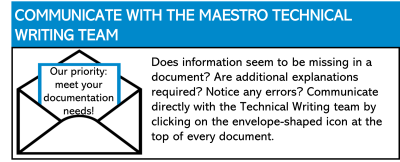Ticket Entry - Invoicing
OBJECTIVE
The Ticket Entry - Invoicing option allows you to manually enter payable tickets that are not imported using the Ticket Management option.
PREREQUISITE
- Configuration
- Project Management
- Define Trucks
- Supplier Management
- Zone Management
- Catalogue Management
Steps
| maestro* > Tickets > Quarry Tickets > Processing > Ticket Entry - Invoicing |
Entering a ticket
- Enter the required information:
Field
Description
Source
Source of the tickets.
NOTE: If the invoicing project configured in Configuration contains “X” characters, they are used as a mask.
NOTE: Selection of the source depends on the project type or the first letter of the invoicing project configured in Configuration.
- Default Values section:
The fields completed in this section are displayed automatically in the Breakdown section for new entries.
Field
Description
Date
Date of the ticket.
NOTE: This date is not necessarily the posting date.
Truck Number
Truck used from Define Trucks.
Product Code
Product code to be invoiced.
NOTE: This product must exist in Catalogue Management.
TR Supplier
Transportation supplier from Supplier Management.
Customer
Customer’s code.
Zone
Zone from Zone Management.
Mode
Available values:
Receivable
Used to generate an invoice for an external customer.
Standard
Used to identify a ticket for which an invoice will be received from a supplier.
Contractor
Used to specify that there are no transportation charges because the product was picked up by the contractor.
NOTE: The VR no. and region are saved with the contractor mode.
KM
Number of kilometers covered.
NOTE: This field is used only if the transportation invoiced is payable.
You must enter an area if transportation is payable.
- Breakdown section:
Only fields that were not previously documented are included in this section.
Field
Description
Ticket No.
Delivery ticket number generated by the scale.
Customer Project
Customer's project number.
NOTE: This field is used if the Def. Internal Ticket field is set to 1-Project in Configuration.
Product Code
Product code to be invoiced.
NOTE: This product must exist in Catalogue Management.
Description
Description that identifies the product.
Name
Customer name.
Contract
Customer’s contract number.
P.O.
Customer’s order number or internal reference number.
NOTE: This field links with the Define Customer Pricing option.
Customer P.O.
Used to specify the customer’s order number if the P.O. field has been used for other purposes.
Quantity
Quantity delivered to the customer.
Sale UP RM
Unit price of the product.
NOTE: The price should be displayed automatically if the UP Product Source field is set to 1-Maestro in Configuration. If the price is not displayed, check whether a price is entered in Catalogue Management, Define Customer Pricing or in a price list.
Transportation Type
Available values:
Receivable
Used to generate an invoice for an external customer.
Standard
Used to identify a ticket for which an invoice will be received from a supplier.
Truck Number
Truck used from Define Trucks.
Description
Name or description of the carrier.
Name
Name of the supplier in the TR Supplier field.
TR P.O. Number
Order number associated with transportation, if the Reconciliation of Receiptsoption is used.
Tr. Quant.
Amount of material transported.
NOTE: This quantity should be displayed automatically and equal the quantity of raw materials.
Sale UP TR
Selling price for transportation.
NOTE: The price should be displayed automatically if the UP Source Transport Rec field is set to 1-Maestro in Configuration. If the price is not displayed, check whether a price is entered in Catalogue Management or Define Customer Pricing.
KM
Number of kilometers covered.
Cost UP TR
Cost of transportation.
Time
Number of hours invoiced, if transportation is not invoiced by ton.
Rate
Hourly rate.
NOTE: The rate may be from the Transportation Rates Table if completed
Address
Shipping address.
City
City in the shipping address
- Click Save.
Once saved, the tickets are available in Ticket Management.
See also
